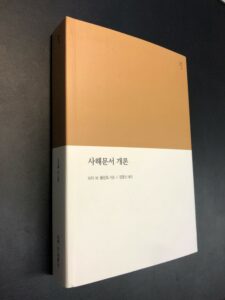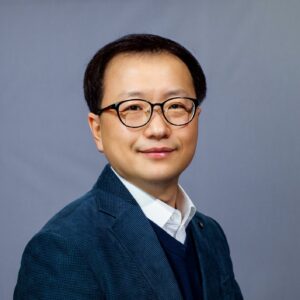The Making of a Good Translation
by Nikki Lanigan
 Each of us has hobbies, things we do with our leisure time that bring us rest, joy, or pleasure. For some people it is hiking a mountain or running a trail. For others it is reading a book or piecing together a puzzle. Still others enjoy small projects, arts or crafts, or the ever-aggravating game of golf. But for Dr. Don Chang, joy comes in the purposeful completion of intentional projects – like translating a book.
Each of us has hobbies, things we do with our leisure time that bring us rest, joy, or pleasure. For some people it is hiking a mountain or running a trail. For others it is reading a book or piecing together a puzzle. Still others enjoy small projects, arts or crafts, or the ever-aggravating game of golf. But for Dr. Don Chang, joy comes in the purposeful completion of intentional projects – like translating a book.
A bit of history will do us well. In 2001, Don started his Master of Arts in Biblical Studies at Trinity Western University. His focus was to study on a fragment of a Thanksgiving Hymn from the Dead Sea Scrolls. Renowned Dead Sea scholar, Dr. Martin Abegg served as Don’s advisor, while equally renowned scholar, Dr. Peter Flint (d. 2016), was filling the prestigious position of Canada Research Chair in Dead Sea Scroll Studies. These influential men, along with other professors, poured into Don’s studies and increased his passion and interest in the Dead Sea Scrolls and the literature of Second Temple Judaism.
Fast forward to 2017. Dr. Peter Flint had completed his book, “The Dead Sea Scrolls” (Abingdon Press, 2013), and Don had completed his PhD at the University of Manchester (2014) and just started teaching at Northwest. Don had read Dr. Flint’s book and was thoroughly impressed with it. Most introductory books on the Dead Sea Scrolls offer a broad overview into the theology of the Dead Sea Scrolls, and answer questions as to the who, what, where, when, and why of the Qumran community. Dr. Flint’s book on the other hand contained essential information but also contained specific data not found in other introductory books, opening students to the world of scholarly research.
Don instantly saw the value this book could bring to Korean students and scholars as there are only a handful of Dead Sea Scroll specialists in Korea and very few publications on the topic. Don reasoned that translating the book could be of potential benefit in the future. So without an agent or publisher, Don set to work, translating in his free time. Hobby started.
Don worked for roughly a year, completing about 1/3 of the book. But then as often happens, time constraints got in the way. His translation work was put on hold and the project was left to sit until the fall of 2022. At that time Don was preparing for an upcoming Sabbatical in which he will be partnering with a prominent Korean scholar to translate Josephus’, “Jewish Antiquity”. The project is being funded and in order to receive the funding the translators needed to have a published translated work to prove their competency in translating.
This lit the fire that Don needed to complete his translation work. He worked steadily, and secured a reputable publisher, GamEunSa. GamEunSa focusses on Korean academic publishing, specifically translating notable, prominent, and well-respected biblical and theological works into Korean. Don submitted his book, 사해문서 개론 (The Introduction to the Dead Sea Scrolls), to GamEunSa in July 2023. Hobby project accomplished.
Regarding the actual work of translating, Don refers to his approach as a “functional dynamic translation.” He explains that many translations accurately reflect a word-for-word English sentence, but simply do not work with Korean conceptions. Hence, a good translation “is really like a reflection of what the English sentence is. It is a rhetorical approach.” To achieve this approach, Don focused on fluency, meaning, and rhetoric. He read his completed Korean translation cover-to-cover three times over, making edits each time, but never once referencing the English version in his second or third edit. He knew the content of the book so simply closed the English book and read the Korean translation to ensure that the final product “was not simply a translation, but an actual ‘Korean’ book.”
In reflecting on the work, Don says the work was a “really good refresher for me. The chapters are not only about discovery, but also the relationship between the Tanakh - the Hebrew Bible/Old Testament, the Septuagint, and the New Testament. There are chapters on who they were and what their theology looked like, their practices and customs, related to New Testament aspects. So those are very interesting chapters that refresh my ideas about the relationship between the circumstances and context in the time of Jesus and the biblical authors.”
What started as a personal interest hobby, has yielded great fruit. Don’s translated book will be used by students, professors, and scholars in both academic and ministry settings. He will be translating Josephus’ Jewish Antiquity, having secured the funding by demonstrating his proficiency in translating. The publisher, GamEunSa, has also asked Don to consider more translation work in the future. But perhaps the greatest fruit is the glory given to God - for Don’s humble and gracious spirit throughout the project, for the book which will educate and expand the minds of Korean professors and pastors, and for future projects which will add to Korean theological libraries.
Congratulations Don on your publication!
 Don Chang, (PhD, University of Manchester) serves as Associate Professor, Biblical Studies at Northwest Seminary. Don's years of pastoral ministry come through in his shepherd's heart: he brings thoughtfulness, compassion, and grace to work with him everyday. Don enjoys filling his office with antique collectibles, and sitting around his table over food, good conversation, and laughter. When he's not teaching (which he does a lot of), he enjoys time with his wife and children.
Don Chang, (PhD, University of Manchester) serves as Associate Professor, Biblical Studies at Northwest Seminary. Don's years of pastoral ministry come through in his shepherd's heart: he brings thoughtfulness, compassion, and grace to work with him everyday. Don enjoys filling his office with antique collectibles, and sitting around his table over food, good conversation, and laughter. When he's not teaching (which he does a lot of), he enjoys time with his wife and children.
